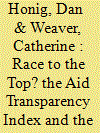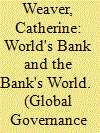| Srl | Item |
| 1 |
ID:
064701


|
|
|
|
|
| Publication |
Jul-Sep 2005.
|
|
|
|
|
|
|
|
|
|
|
|
|
|
|
|
| 2 |
ID:
168199


|
|
|
|
|
| Summary/Abstract |
Recent studies on global performance indicators (GPIs) reveal the distinct power that nonstate actors can accrue and exercise in world politics. How and when does this happen? Using a mixed-methods approach, we examine the impact of the Aid Transparency Index (ATI), an annual rating and rankings index produced by the small UK-based NGO Publish What You Fund. The ATI seeks to shape development aid donors' behavior with respect to their transparency—the quality and kind of information they publicly disclose. To investigate the ATI's effect, we construct an original panel data set of donor transparency performance before and after ATI inclusion (2006–2013) to test whether (and which) donors alter their behavior in response to inclusion in the ATI. To further probe the causal mechanisms that explain variations in donor behavior we use qualitative research, including over 150 key informant interviews conducted between 2010 and 2017. Our analysis uncovers the conditions under which the ATI influences powerful aid donors. Our mixed-methods evidence reveals how this happens. Consistent with Kelley and Simmons's central argument that GPIs exercise influence via social pressure, we find that the ATI shapes donor behavior primarily via direct effects on elites: the diffusion of professional norms, organizational learning, and peer pressure.
|
|
|
|
|
|
|
|
|
|
|
|
|
|
|
|
| 3 |
ID:
079571


|
|
|
|
|
| Publication |
2007.
|
| Summary/Abstract |
Who or what shapes and drives the policy and operational behavior of the World Bank? The objective of this essay is to lay the conceptual and empirical framework for this special issue. I begin by constructing a synthetic theoretical model-drawing from principal-agent models and sociological institutionalism-to delineate the set of external and internal factors shaping Bank behavior. I then lay the empirical groundwork by exploring the most salient characteristics of the "world's Bank," taking special note of the Bank's relationship with the United States, borrowing states, and nongovernmental organizations. In the second half, I focus on the "Bank's world," investigating the internal bureaucratic politics and culture of the Bank. Specifically, I examine the sources and nature of the Bank's "intellectual culture" (characterized by its economistic, apolitical, and technical rationality), its "operational culture" (portrayed as driven by approval and disbursement imperatives), and the dynamics of bureaucratic politics that pervade the hierarchy of the Bank.
|
|
|
|
|
|
|
|
|
|
|
|
|
|
|
|